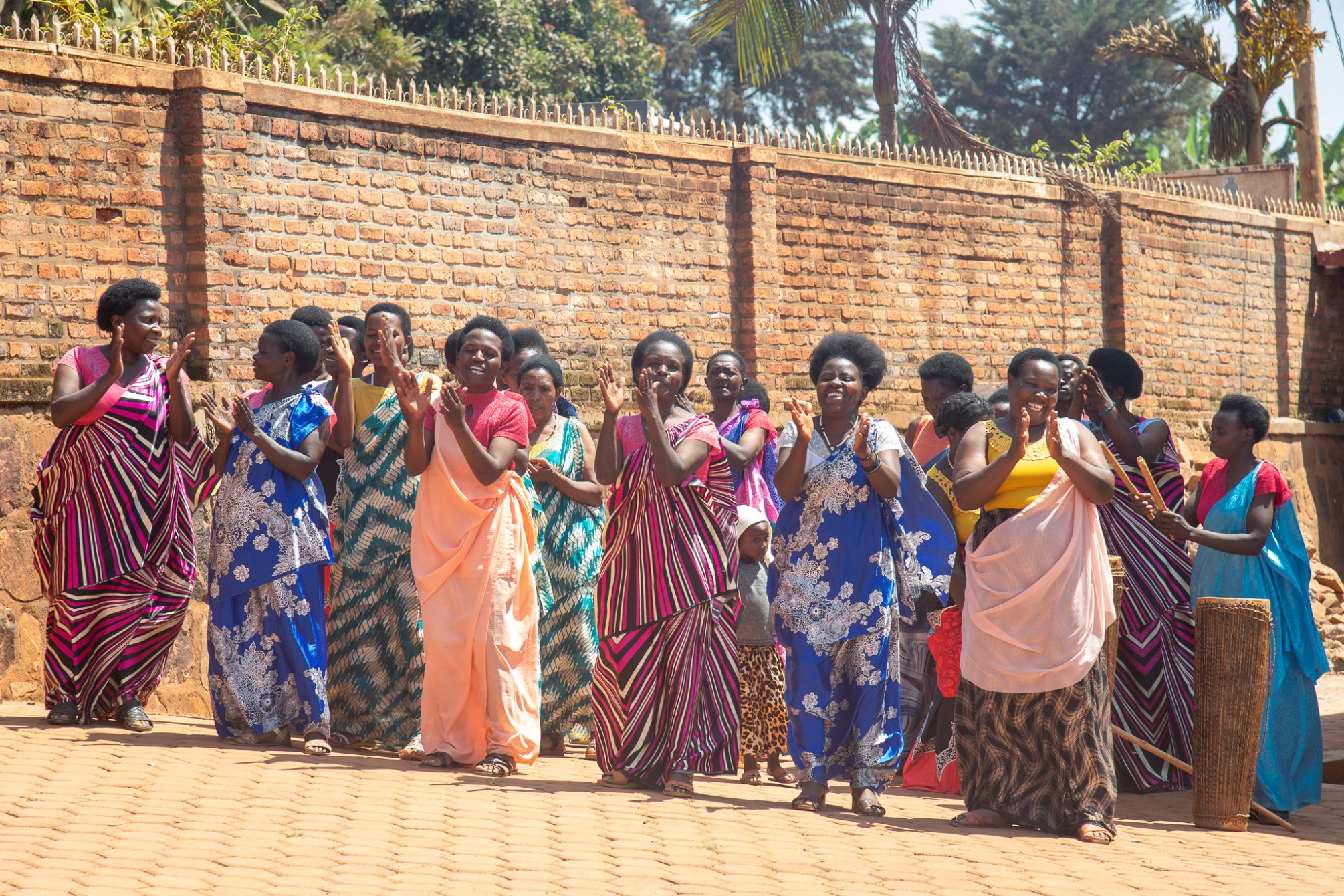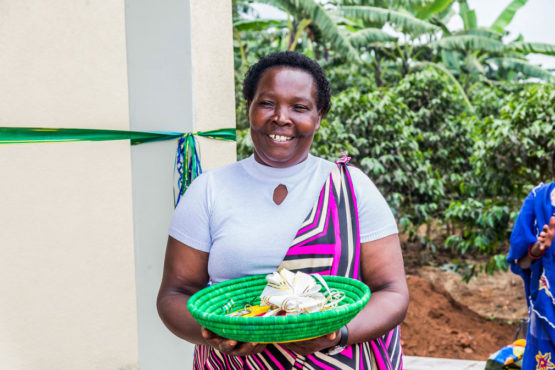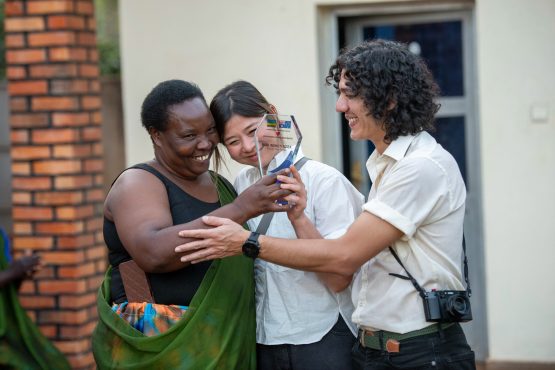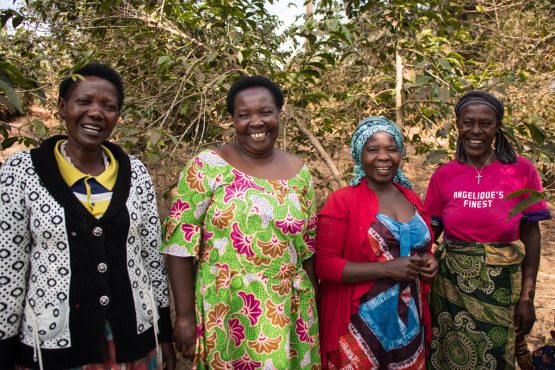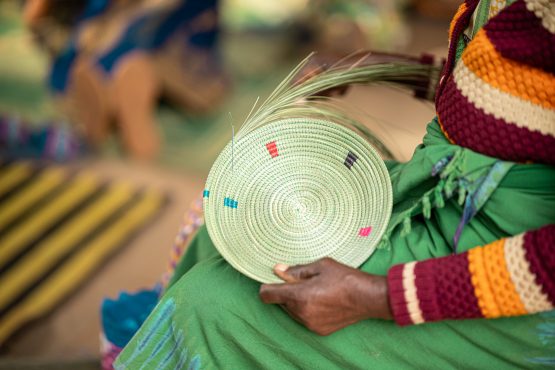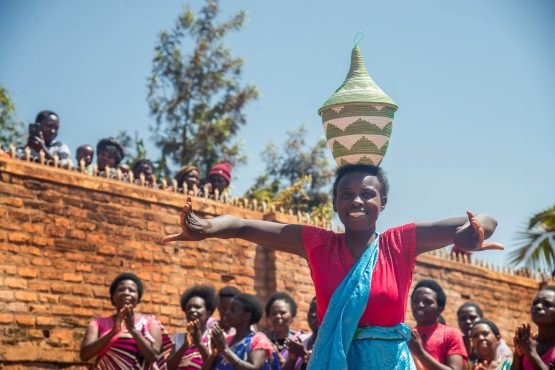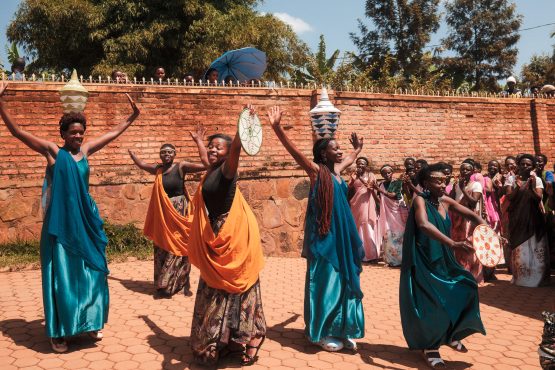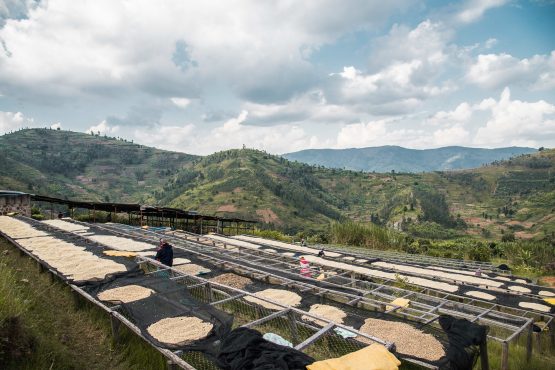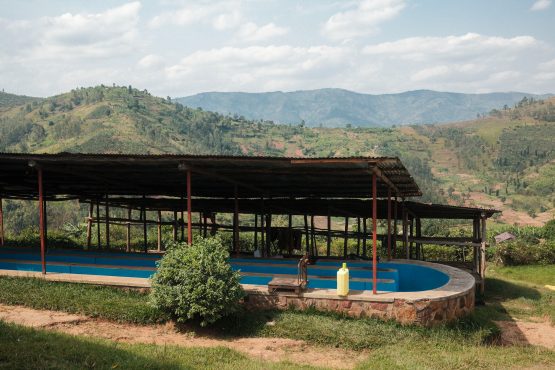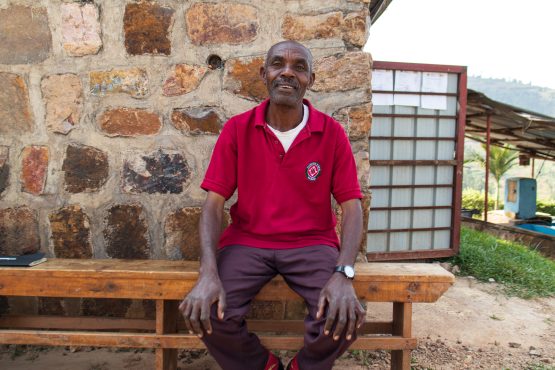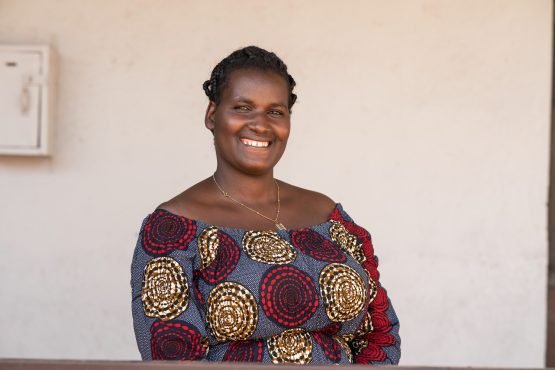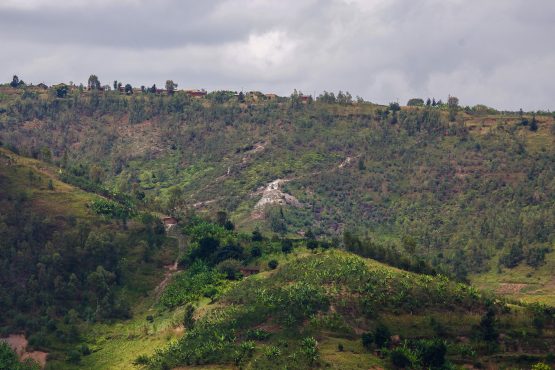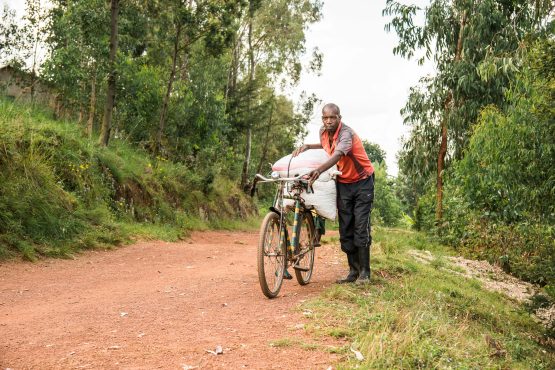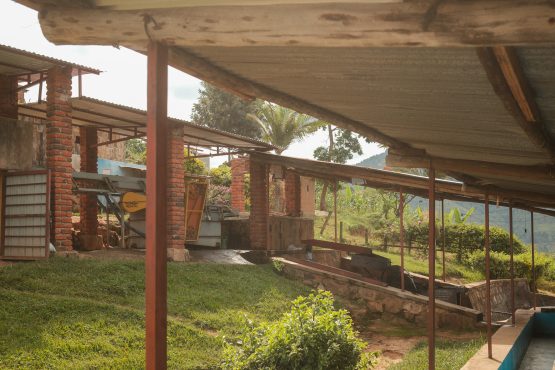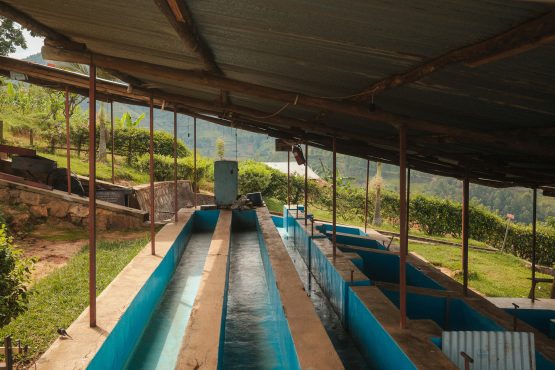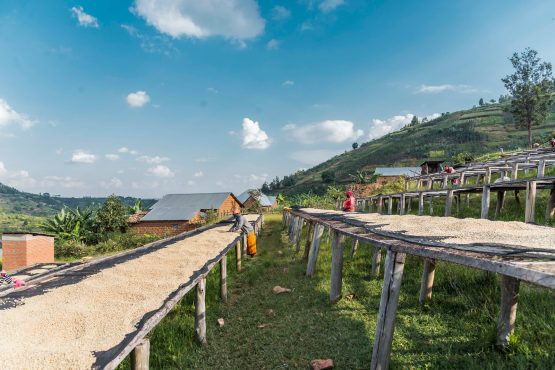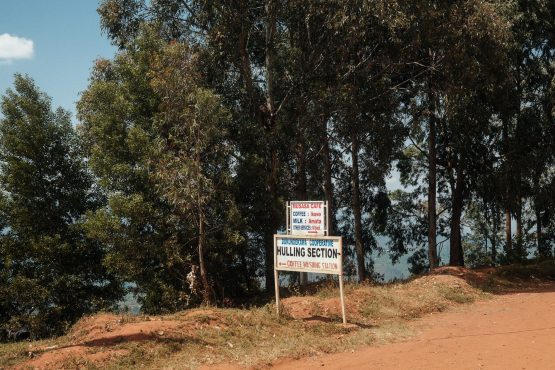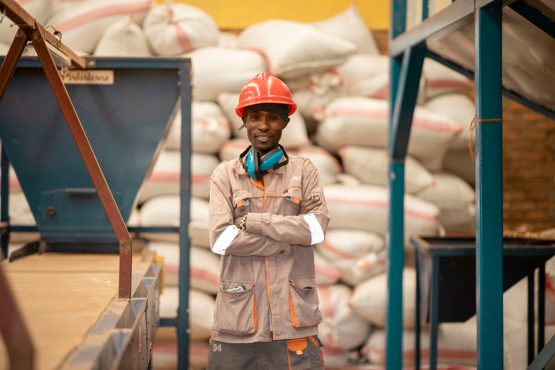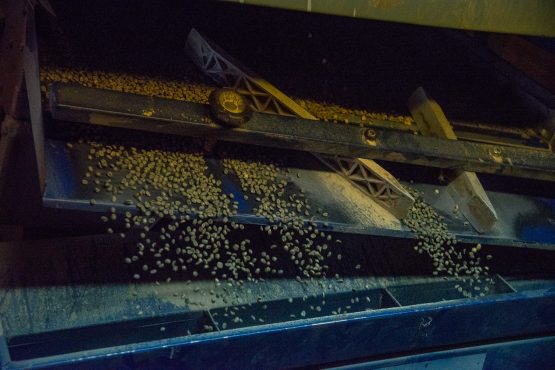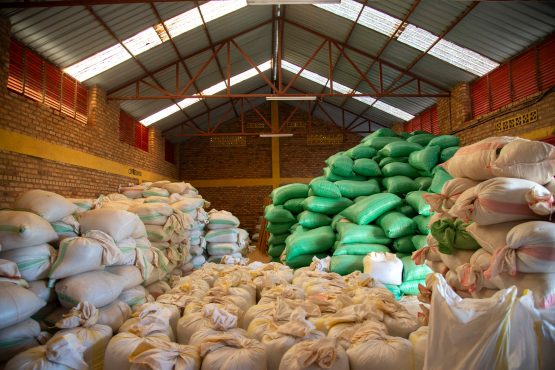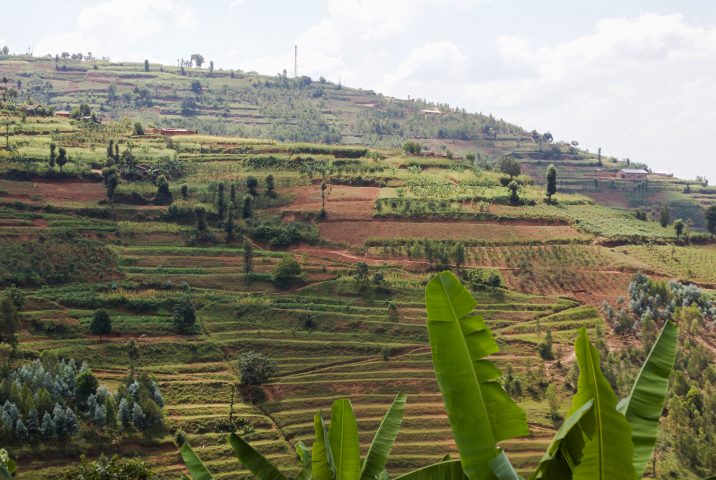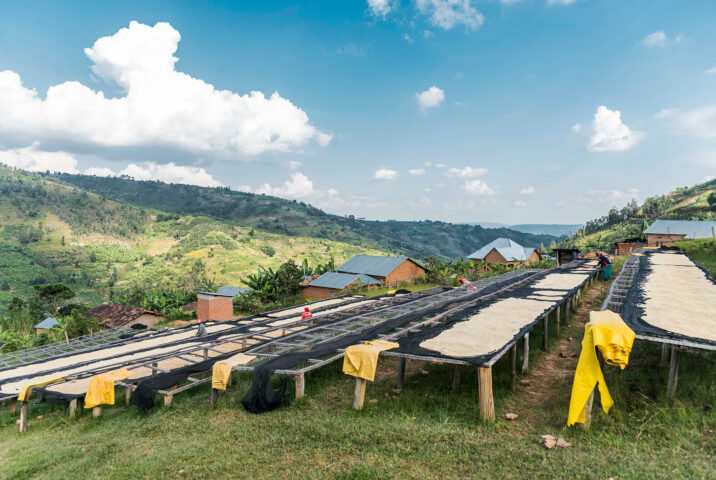Nkara Women’s Coffee
Pink grapefruit and nectarine with bergamot florals. Tea-like body with great structure.
Out of all the coffee we source, few offerings make an impact as significant as our women’s coffee microlots from Rwanda, as they are key in securing financial independence to countless women across the country. This special offering was produced using coffee cherry grown by 75 women who own small farms in the hills surrounding Nkara washing station, the largest and busiest of three washing stations owned by the Dukunde Kawa Cooperative.
Unlike most coffee-producing countries, where a farmer’s land size is used as a measure of scale, farms in Rwanda are often very small, and as a result production capability is measured by the number of trees a farmer tends to. The majority of women who contributed to this lot own a couple of hundred trees, planted on one tenth of a hectare of land, along with subsistence food crops like maize, beans and sorghum and livestock like cows, goats and chickens.
Many of the women who contributed to this lot are also members of Rambagirakawa, a women’s alliance within Dukunde Kawa that was formed to advocate for support and resources for female coffee producers. Through collaboration with both Rambagirakawa and international buyers, Dukunde Kawa has assisted the women in processing and marketing their coffees as a separated ‘Women’s Coffee’ lot, which earns them an additional bonus payment on top of the quality premium all cooperative members receive. To distinguish their coffee and ensure it is processed separately, the women have organised to deliver cherry to the washing station on certain days of the week. While this lot was processed at Nkara washing station, members of Rambagirakawa may also deliver to its sister washing stations, Mbilima and Ruli, depending on where they live.
Established in 2012, Rambagirakawa is one of Dukunde Kawa’s most inspiring success stories. The association was founded by Odette Murekatete, who hoped to band the co-op’s women together to have a louder voice within Dukunde Kawa. Many of Rambagirakawa’s founding members were widowed by the 1994 genocide and already relied upon each other for farming and financial advice — by initiating an official association within the cooperative, they widened their reach and secured ongoing funding for their projects. The result is an empowered and ambitious alliance of women, whose ever-expanding activities focus on creating opportunity and success for the women and children in their community.
The group is open to all of the female members of Dukunde Kawa and has grown to 304 members. Besides selling their coffees as separated lots, members have wholeheartedly pursued additional income opportunities, like basket weaving and embroidery, to develop greater economic independence. The funds generated by the sale of these crafts are significant, and have become one of the co-op’s five main sources of income. Using their share of the profits generated, around half of Rambagirakawa’s members have been able to undertake upgrades to their homes, while most members have also invested them in the education of their children and grandchildren.
Outside of coffee, the women regularly come together socially and to work other projects and many have developed greater confidence within the cooperative and the community at large as a result. For example, the team of dancers and singers who welcome us to Dukunde Kawa every year, work on the songs and routines in the weeks leading up to the period when most coffee buyers visit. Over the years, they have become quite well-known in the region of Ruli, and have even been invited to perform at official ceremonies in town. Since our first visit, the routines have become more intricate and complex, yet the smiles and joy we witness have never felt forced. When we mentioned this to the troupe’s leader (also named Odette, Odette Mukeshimana) on our most recent trip, she agreed with our sentiment and told us it’s because when performing she’s “manifesting happiness for herself and she expresses it through dance.”
ABOUT NKARA WASHING STATION
The picturesque Nkara is Dukunde Kawa Cooperative’s smallest and most remote washing station. Sitting in a valley at 1,880 meters above sea level, the site overlooks a beautiful landscape of rolling green hills dotted with farms and forests.
Unlike most coffee-producing countries, where land size is used as a measure of scale, farms in Rwanda are often very small, and production capability is determined by the number of trees a farmer tends to. The majority of producers who contribute to the Nkara washing station own a couple of hundred trees, planted on one tenth of a hectare of land, along with subsistence food crops like maize, beans and sorghum and livestock like cows, goats and chickens.
Established in 2007, Nkara is the third and final washing station built by Dukunde Kawa Cooperative. Day to day operations are overseen by Michel Dusengimana, who has been the manager since the start, while quality control operations are overseen by Emerthe Mukamurigo. As one of the original farmer members of the cooperative, Michel is fully committed to the work of Dukunde Kawa. He began full-time employment at the co-op in 2004, as a machine operator at Ruli washing station, where he processed the cooperative’s first batch of coffee cherries. When the building of Nkara was completed and production large enough to need a full-time station manager, Michel was eager to take the role on, and nearly twenty years later, he remains as enthusiastic as ever.
While Michel’s team may not be as large as those in Dukunde Kawa’s other washing stations, he leads them with great care and respect. During the harvest, cherries begin to be delivered as early as 10AM, to be processed from 6PM onwards. On our most recent visit, we asked Michel how he keeps staff motivated, particularly during the season’s busiest periods, to which he replied, “One of the things I do, is I respect their time, so they always know the day’s starting point and ending time. This way no one has to overstay or do extra hours, and everyone can go home on time to live their lives.” When we then asked Michel how he remained so motivated after so many years in the job, his response was pragmatic and insightful, “The more good coffee you produce, the more money you can earn. When you have an ongoing revenue, you can respond to any need and develop together with your family. Coffee is the best cash provider out of any other crops grown here.” For the future of Nkara, Michel hopes to continue to see improvements. “We want to expand our production capacity and renovate the infrastructure, so we can keep producing good coffee,” he told us with a smile.
As a contributor to Nkara himself, Michel is happy to advocate for the agronomical advice offered by Dukunde Kawa with his neighbours and friends. While historically many farmers in the region have grown coffee as a monoculture on its own plot, in recent years the cooperative has begun to encourage practices that promote a richer biodiversity. This includes the planting of shade trees to protect the plants’ foliage, and squash to provide cover for the soil.
Head here to learn more about the work of Dukunde Kawa in Rwanda.
PROCESSING AT NKARA WASHING STATION
The team at Dukunde Kawa takes a huge amount of care in processing its coffee. All members of the cooperative are trained to only select ripe coffee cherries from their trees.
- On delivery, the cherries are inspected and sorted by hand to ensure only the very ripest cherries are processed. Farmers do the selecting, and receive the highest income from the ripest, healthier fruit. The remainder of their crop still gets purchased by the co-op, at a lower price, to be processed and sold for the internal market.
- Cherry is then sorted by weight using a Pinhalense machine, with any floaters are removed. By using a machine, rather than a clerk, Dukunde Kawa are more transparent with contributing growers about which fruit gets processed. Coffee is then pulped using a mechanical pulper that divides the beans into three grades by weight, with the heaviest, A1, usually having the highest cup quality.
- After pulping, the coffee is pre-washed, graded again using floatation channels that sort the coffee by weight, and left to ferment overnight for around 12–18 hours. The following day, wet parchment is the washed a second time and left to ferment for a further six hours — with the goal of removing as much mucilage as possible without using machinery that may accidentally crush or damage the beans.
- As with most washing stations in Rwanda, women do the majority of hand-sorting. This takes place in two stages – on the covered pre-drying tables and on the drying tables. Washed beans are moved from the wet fermentation tanks onto the pre-drying tables, where they are intensively ‘wet sorted’ under shade for four hours. The idea is that greens (unripe beans) are still visible when the beans are damp, while the roofs over the tables protect the beans from the direct sunlight.
- Next, the beans are moved onto the washing station’s raised drying tables for around two weeks, where they are sorted again for defects, turned regularly and protected from rain and the midday sun by covers, ensuring both even drying and the removal of any damaged or defective beans. During this period the coffee is also turned several times a day by hand to ensure the coffee dries evenly and consistently.
- After reaching 11-12% humidity, the coffee is then transported to Dukunde Kawa’s purpose-built warehouse prior to final dry milling and hand sorting at the cooperative’s milling facilities.
- Located in Ruli, Dukunde Kawa’s dry mill has the capacity to process one full container of coffee a day — and combines the use of technology with meticulous hand sorting to ensure only the best beans are bagged. Before being loaded for export, Rwanda’s National Agricultural Export Development Board also inspects and samples the prepped parchment.
WHY WE LOVE IT
We feel incredibly proud of our partnership with Rambagirakawa, and with how much support the Australian and Thai coffee communities have shown for their projects. Since the first ‘Women’s Coffee’ lot we purchased in 2018, the alliance has grown in numbers and in influence within Dukunde Kawa cooperative, and we’re excited to feature another one of their lots processed at Ruli this year. The latest crop is well-structured and delicate, with pink grapefruit, nectarine and bergamot florals in the cup.
